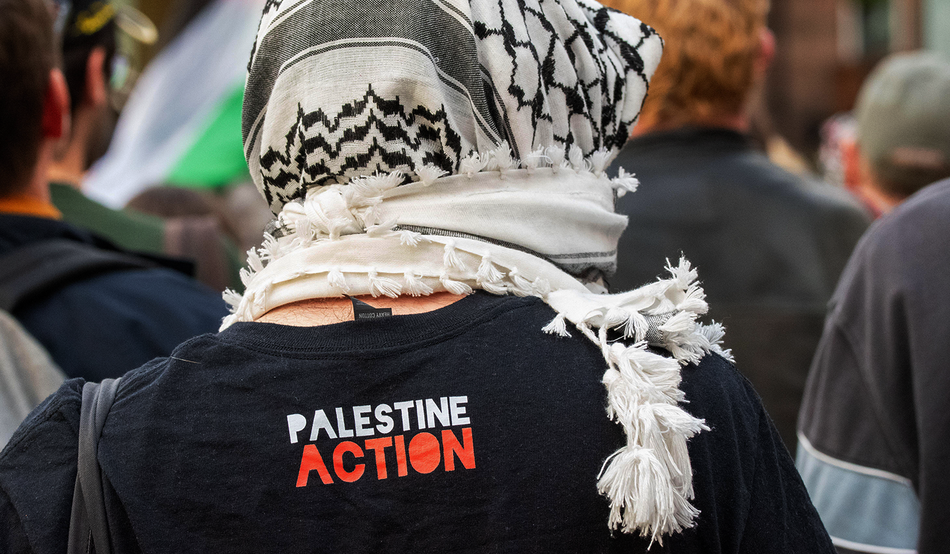On 9th August a man was arrested in London for wearing a T-shirt on which the words “Plasticine Action” were printed alongside an image of the 1970s TV character Morph. The T-shirt also carried the phrase: “We oppose AI-generated animation.”
The arrest was under section 13 of the Terrorism Act 2000, which provides that a person in a public place commits an offence if they wear “an item of clothing […] in such a way or in such circumstances as to arouse reasonable suspicion that he [or she] is a member or supporter of a proscribed organisation.”
What is a “proscribed organisation” under this legislation? They are the organisations listed in schedule 2 of the law, which can be updated from time-to-time by statutory instrument. You will see that listed there are dangerous organisations such as ISIS and Al-Qaeda. But you will not find “Plasticine Action”.
The police, of course, had made a mistake. They mistook this man’s T-shirt for one in support of Palestine Action, an organisation that was proscribed at speed this summer. The then home secretary, Yvette Cooper, announced the proscription on 23rd June; it passed both houses of parliament on 2nd and 3rd July; and it came into effect on 5th July.
This had followed an incident on 20th June, where two Palestine Action protesters broke into RAF Brize Norton and sprayed red paint on a Voyager aircraft. That incident followed a similar action in 2022 at a weapons equipment factory in Glasgow and in 2024 at a military technology firm in Bristol.
In respect of each of these three incidents there have been arrests and prosecutions under the general criminal law. The government, however, believing that the general criminal law was no longer sufficient in meeting the risks posed by Palestine Action, decided to proscribe the group.
One effect of this proscription is to criminalise membership of the group (under section 11 of the 2000 legislation). But under the United Kingdom’s one-size-fits-all terrorism legislation it also criminalises wearing items of clothing (under section 13), as we have seen, and support and expressions of support for that organisation (under section 12).
The section 12 offence was originally limited to a person who “invites support for a proscribed organisation”. But in 2019 this provision was widened to include a person who “expresses an opinion or belief that is supportive of a proscribed organisation, and […] in doing so is reckless as to whether a person to whom the expression is directed will be encouraged to support a proscribed organisation”.
The 2019 amendment was a marked incursion into the general right of free expression. A person was to be a criminal not if they were a member or a supporter of a proscribed organisation, but for merely expressing an opinion or belief that is supportive of that organisation.
As such the law now goes much further than targeting the activists causing damage (who can be dealt with by the general criminal law) and to those supporting those activists. This is because, when an organisation is proscribed, then sections 12 and 13 are triggered too.
In this instance, proscription has led to many more arrests than the man wrongly arrested for supporting “Plasticine Action”. In London 857 people were arrested under the Terrorism Act on one day earlier this month. It is currently not clear how many of these arrests will lead to any further criminal proceedings.
The scale of these arrests is eye-catching, and it would seem that arrests in such numbers (especially if there is no further action against the arrestees) risks bring the law itself into disrepute.
There are also questions about whether protesting, or even querying, the proscription of an organisation is itself expressing an opinion or belief that is supportive of a proscribed organisation. One can oppose the aims of an organisation while also thinking that adding it to schedule 2 was misconceived and illiberal.
There is currently a judicial review going through the courts where a challenge is being made to the proportionality of proscribing Palestine Action. A hearing is planned for the end of this month, though the government is appealing the decision to give permission for the review.
The courts are often deferent to the government in such cases. The assumption is that the home secretary is well placed to make the judgement call. In the case of Palestine Action, there is “closed” material which the government is relying on for the proscription that is not available to the public. We do not know what it says.
But even taking what could be in the closed material at its highest, it is difficult to see the justification for proscription triggering the section 13 offence. It is presumably the activists planning and causing criminal damage that are the focus of the ban here, not hundreds—perhaps soon thousands—of people expressing an opinion in support.
And as with the Covid prohibitions there are certain operational matters that the police are better at dealing with than others. Expecting the police to enforce the provisions dealing with expressions of opinion or belief risks mistakes such as the arrest for the “Plasticine Action” T-shirt. There should also be no legal jeopardy for those concerned at the proscription itself as a matter of principle.
The terrorist legislation of the United Kingdom is massive. There have been 11 acts of parliament with “terrorism” in their titles since the 2000 Act. But it is also clumsy, and this clumsiness serves no public interest.
Even if there was justification for the government proscribing Palestine Action in respect of membership, that justification may not automatically extend to triggering the section 12 and 13 offences. Yet under the structure of our terrorism legislation there is no other choice. Terrorism law should not be rigid but flexible—like, well, plasticine.













